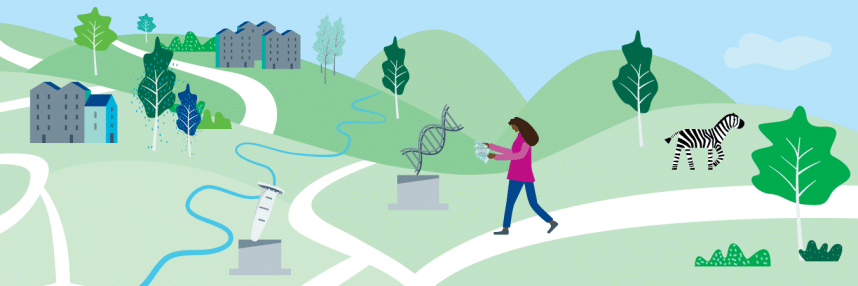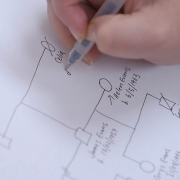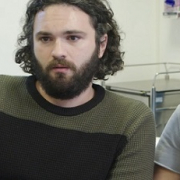Professional journeys into genomics: Taking the first step
In this blog series for the 2024 Genomics Conversation, NHS healthcare professionals from medicine, nursing, pharmacy and midwifery share their inspiring genomics journeys
For this year’s Week of Action, we wanted to shine a spotlight on the healthcare professionals across the NHS who have embraced genomics as part of their day-to-day clinical practice. In this three-part blog series, we speak to five individuals working in different specialties about how they first got interested in genomics, how they built up their knowledge and how they see genomic medicine in the NHS developing in the future.
“Unfortunately my grandma passed, and I just realised what a gap there was in personalised medicine.”
Growing up in Nigeria, Dr Tobi Soge found himself drawn at a young age to the question of what makes us different. “I think I saw too many sci-fi movies,” he says. “I watched too many cartoons about superheroes, about playing with the human genome, and it just got me really curious. I became interested in knowing our genetic make-up, about how it can be improved upon.”
Tobi went to medical school and decided to specialise in cardiology. However, it seemed that genomics was never far away. “There were a lot of patients with genetic conditions, but genomics wasn’t really a thing in Nigeria back then. If someone had a genetic condition, a lot of people accepted it as fate – there was not a lot of active treatment for them, there wasn’t a lot of education on rare disease.”
Tobi, now a specialist registrar in cardiology at University Hospitals Derby and Burton, eventually completed the Master’s in Genomic Medicine, funded by NHS England’s Genomics Education Programme. Ultimately, it was the death of his grandmother from colorectal cancer that finally spurred him on to do it. “She was getting a lot of treatments in the hospital in Nigeria, and none of it was working, so she had to go to the US – and that’s where she had tests like DNA sequencing and immunohistochemistry, and they realised that none of the treatment she’d had in Nigeria was even sensitive to her cancer subtype. Unfortunately my grandma passed, and I just realised what a huge gap there was in personalised medicine.”
“I thought, ‘I’d better learn a bit about this.’”
Jessica Keen is a practising pharmacist with The Christie NHS Foundation Trust in Manchester and pharmacy lead for the North West Genomic Medicine Service Alliance. Her genomics journey began several years ago, when she was working full-time as an oncology pharmacist. “We had a patient have some really quite severe side effects to their chemotherapy treatment and end up in critical care,” she explains. “When they did some genomic testing, they found that the patient had a predisposition to toxicity – they had a variant in a gene called DPYD [this causes DPD deficiency syndrome, which affects the patient’s ability to metabolise fluoropyrimidine-based chemotherapies and can lead to severe, even life-threatening side effects]. The patient hadn’t been pre-emptively tested, the variant was just found afterwards – and that was quite interesting to me, that that was a thing you could be tested for beforehand but we just didn’t do that type of testing.” This remained the case until 2020 when the Medicines and Healthcare products Regulatory Agency produced an alert recommending that the DPYD variant test be completed before any patient was prescribed fluoropyrimidine-based chemotherapy. “That was really interesting,” Jessica says. “I thought, ‘I’d better learn a bit about this.’”
For Marianne Quinn, regional NIPT screening midwife coordinator at St George’s Hospitals NHS Foundation Trust in London, genomics actually came first. “I did an undergraduate degree in genetics before I did midwifery,” she explains. “In my final year, we did an epigenetics module that used an example of a mum who smoked in pregnancy, and they found genetic changes not just in the fetus, which was female, but within the fetus’ own eggs. So that one thing had a two-generational effect. I just thought, ‘That is crazy.’ I knew then that I wanted to go into screening midwifery and fetal medicine.”
“Even when I was asking patients about their family history, I never thought about genetic conditions.”
With genomic medicine featured prominently in the NHS Long Term Plan, there are more genomics-specific roles opening up all the time. Amy Roberts has been a nurse for 12 years, six of which she spent in women’s services. Then, after a stint in the community and another in the digital health team, she decided to return to women’s services – but when a friend pointed out the new Lynch syndrome specialist role that had just opened up, Amy admits that she didn’t really know what she was looking at. “I said, ‘What’s Lynch syndrome?’” she recalls. “It wasn’t until I got an interview that I thought, ‘Right, I need to knuckle down and find out what this is.’ Before that, [genomics] wasn’t something I had ever encountered – even when I was asking patients about their family history [while working on cancer wards], I’d never thought about genetic conditions.”
It’s very common for healthcare professionals to find themselves on a genomics journey almost without realising it. This is certainly the case for Dr Bernadette Khodaghalian, who has just finished her training in inherited cardiac conditions at Alder Hey Children’s Hospital in Liverpool. “I was a paediatrician until 2018,” she says, “and then I did some paediatric cardiology. Two or three years in, I realised that inherited [cardiac conditions] was of interest, and very quickly I also found genomics really interesting, and realised that the two are quite closely intertwined.” Like Tobi, Bernadette eventually went on to complete the Master’s in Genomic Medicine, which would provide a foundation for her new career path.
Genomics is an incredibly broad discipline, and it’s common for healthcare professionals just starting out on their journeys to feel overwhelmed – many have no idea where to begin. Join us for part two of our blog series, in which our contributors talk through building their own genomics knowledge and how it changed the way they approach their day-to-day clinical practice.









